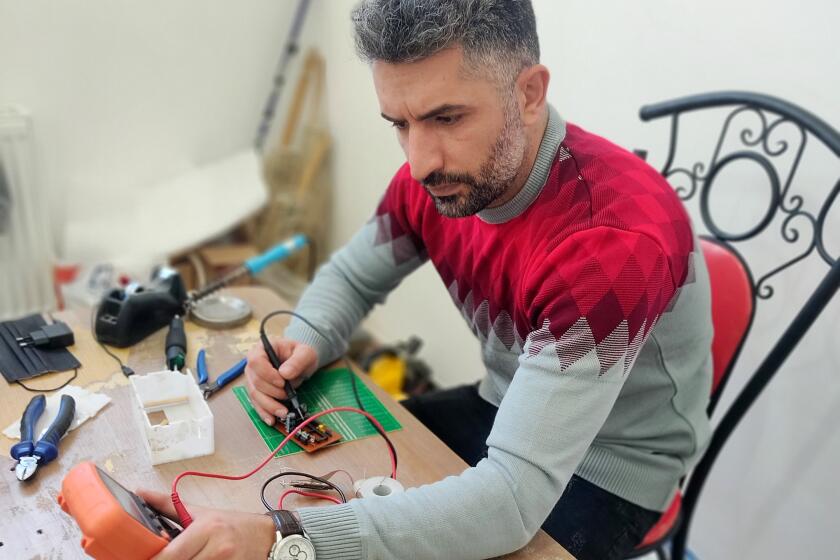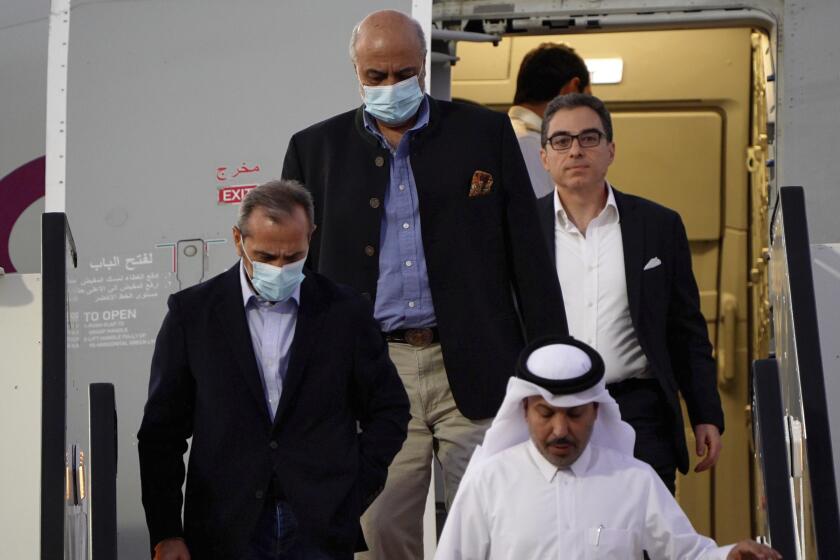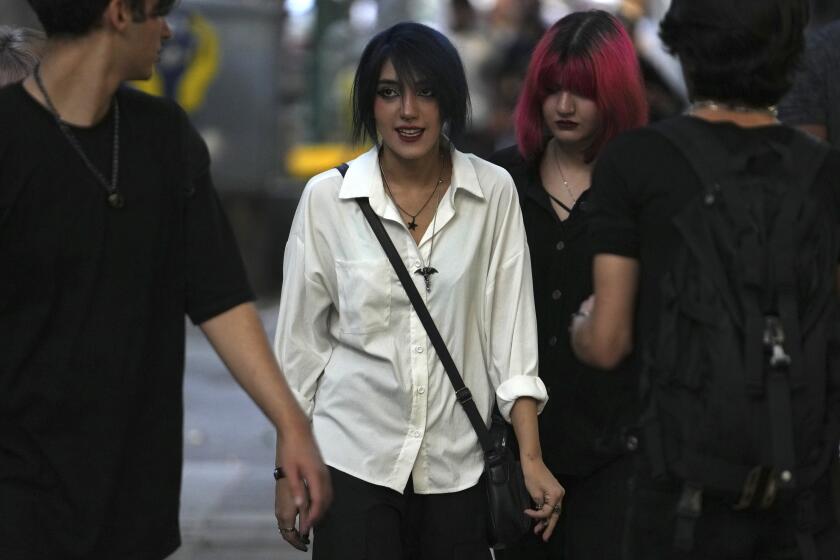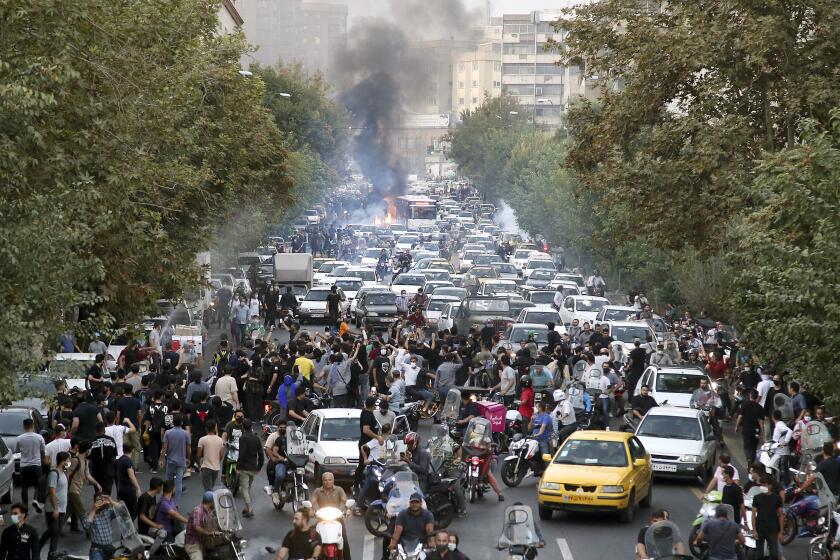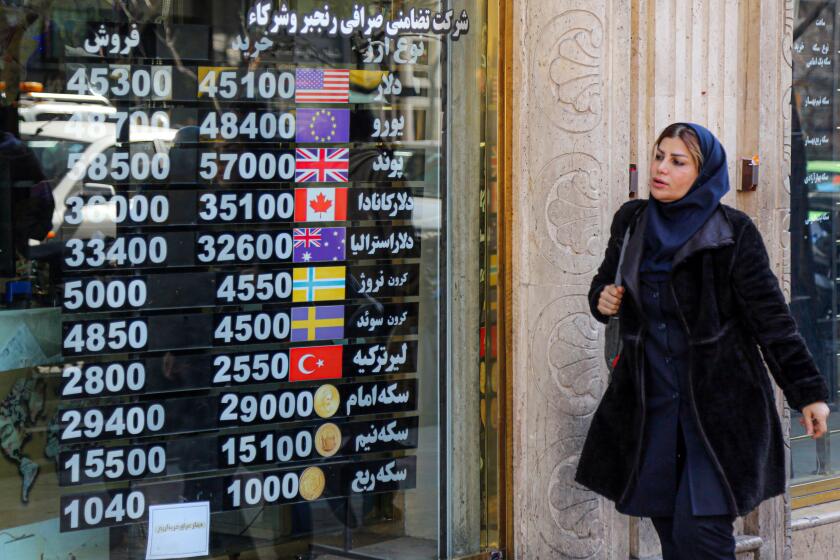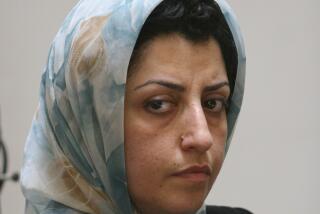Imprisoned Iranian human rights activist Narges Mohammadi wins Nobel Peace Prize
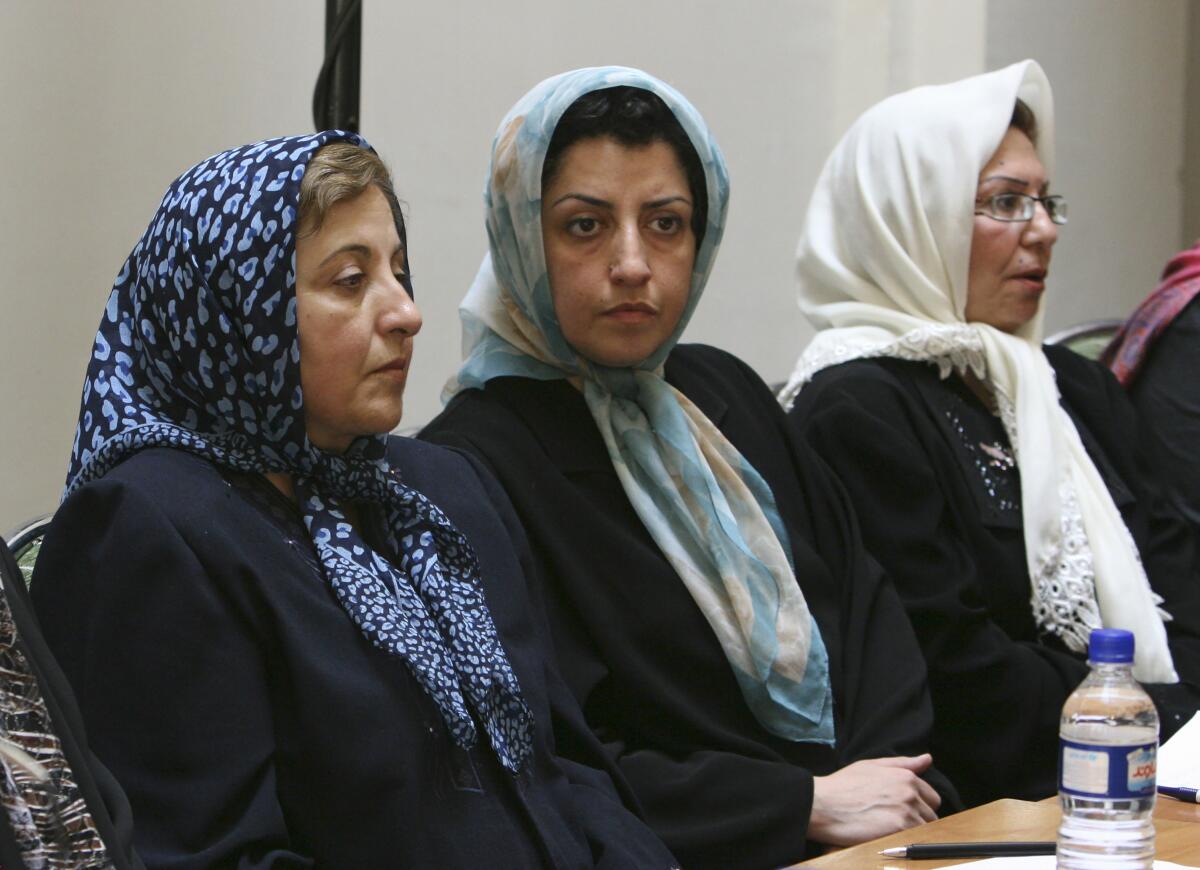
Imprisoned Iranian activist Narges Mohammadi won the Nobel Peace Prize on Friday in recognition of her tireless campaigning for women’s rights and democracy and against the death penalty.
Mohammadi, 51, has kept up her activism despite numerous arrests by Iranian authorities and spending years behind bars. She has remained a leading light for nationwide female-led protests, sparked by the death last year of a 22-year-old woman in police custody. Those demonstrations grew into one of the most intense challenges ever to Iran’s theocratic government.
“This prize is first and foremost a recognition of the very important work of a whole movement in Iran with its undisputed leader, Narges Mohammadi,” said Berit Reiss-Andersen, the chair of the Norwegian Nobel Committee, who announced the prize in Oslo. She began the announcement with the words “woman, life, freedom” in Persian — the slogan of the demonstrations in Iran.
Reiss-Andersen said the committee hopes the prize “is an encouragement to continue the work in whichever form this movement finds to be fitting.” She also urged Iran to release Mohammadi in time for the Dec. 10 prize ceremony.
For nearly all of Mohammadi’s life, Iran has been governed by a Shiite Muslim theocracy headed by the country’s supreme leader. While women hold jobs, academic positions and even government appointments, their lives can be tightly controlled. Laws require all women to at least wear a headscarf, or hijab, to cover their hair as a sign of piety. Iran and neighboring Afghanistan remain the only countries that mandate it.
In a statement released after the Nobel announcement, Mohammadi said she would “never stop striving for the realization of democracy, freedom and equality.”
Mohsen Chavoshi, one of Iran’s most famous singers, has helped rescue more than 50 people from the gallows in a country where justice can be harsh.
“Surely, the Nobel Peace Prize will make me more resilient, determined, hopeful and enthusiastic on this path, and it will accelerate my pace,” she said.
Mohammadi, an engineer by training, has been imprisoned 13 times and convicted five times, according to Reiss-Andersen. In total, she has been sentenced to 31 years in prison. Mohammadi’s most recent incarceration began when she was detained in 2021 after she attended a memorial for a person killed in nationwide protests sparked by an increase in gas prices.
She has been held at Tehran’s notorious Evin Prison, whose inmates include those with Western ties and political prisoners.
Her brother, Hamidreza Mohammadi, told the Associated Press by telephone that he has not been in touch with his sister but that the prize “means a lot to her.”
Five American citizens held for years in Iran under what U.S. officials describe as brutal conditions were freed Monday, President Biden said.
Despite that and the fact that “the prize means that the world has seen this movement,” the award will not affect the situation in Iran, he said.
“The regime will double down on the opposition, and it will have no effect on the regime,” he said. “They will just crush people.”
Waiting for the announcement “was nerve-racking,” he said. But he knew immediately that his sister had won when he heard Reiss-Andersen saying “woman, life, freedom” in Persian.
Mohammadi’s husband, Taghi Rahmani, who lives in exile in Paris with their two children, 16-year-old twins, said that although he hadn’t been able to reach her since the announcement, she “would be very glad to know she has won an award and she will restate her determination like always.”
After doing little to enforce the law for months, Iran’s theocratic government is cracking down on women who decline to wear the mandatory headscarf.
“She has a sentence she always repeats: ‘Every single award will make me more intrepid, more resilient and more brave for realizing human rights, freedom, civil equality and democracy,’” he said.
Rahmani hasn’t been able to see his wife for 11 years, and their children haven’t seen their mother for seven, he said.
Their son Ali said the prize was not just for his mother.
“It’s for the struggle,” Ali said. “Iranian men and women have been fighting for over a year. This prize is for the entire population, for the whole struggle from the beginning, since the Islamic government came to power.”
A mysterious injury suffered by a 16-year-old girl who was not wearing a headscarf in Tehran has reignited public anger in Iran.
Mohammadi is the 19th woman to win the Nobel Peace Prize and the second Iranian woman after human rights activist Shirin Ebadi, who won the award in 2003.
It’s the fifth time in the 122-year history of the awards that the peace prize has been given to someone who is in prison or under house arrest. Last year, the top human rights advocate in Belarus, Ales Bialiatski, was among the winners. He remains imprisoned.
“Her brave struggle has come with tremendous personal cost,” Reiss-Andersen said of Mohammadi. “Ms. Mohammadi is still in prison as I speak.”
Mohammadi was behind bars for the recent protests over the death of Mahsa Amini, who had been picked up by the morality police for her allegedly loose headscarf. More than 500 people were killed in a heavy security crackdown, while over 22,000 others were arrested.
Iran reportedly arrested two prominent actresses, Hengameh Ghaziani and Katayoun Riahi, for not wearing hijabs in public as the country’s government continues to crack down on ongoing protests.
In a first reaction from Tehran to the Nobel announcement, the semiofficial Fars news agency dismissed Mohammadi as someone who “persisted in creating tension and unrest and falsely claimed that she was beaten in prison.”
Fars is believed to be close to Iran’s hard-line paramilitary Islamic Revolutionary Guard, which answers only to Supreme Leader Ayatollah Ali Khamenei.
Abuse in Iranian prisons — something Mohammadi has campaigned against both inside and outside prison — has been widely reported by the United Nations and human rights groups.
In Tehran, some people expressed support for Mohammadi and her resilience.
“The prize was her right. She stayed inside the country, in prison and defended people. Bravo!” said Mina Gilani, a high school teacher.
Arezou Mohebi, a 22-year-old chemistry student, said the prize was “an award for all Iranian girls and women,” and described Mohammadi “as the bravest I have ever seen.”
Political analyst Ahmad Zeidabadi wrote online that the prize might lead to more pressure on Mohammadi.
“The prize will simultaneously bring possibilities and restrictions,” he wrote. “I hope Narges will not be confined by its restrictions.”
News Alerts
Get breaking news, investigations, analysis and more signature journalism from the Los Angeles Times in your inbox.
You may occasionally receive promotional content from the Los Angeles Times.
Before being jailed, Mohammadi was vice president of the banned Defenders of Human Rights Center in Iran. Fellow Nobel laureate Ebadi, whom Mohammadi is close to, founded the center.
For the record:
11:34 p.m. Oct. 6, 2023A previous version of this story said Narges Mohammadi had won the Andrei Sakharov Prize for Freedom of Thought in 2018. She has never won that prize, presented by the European Parliament, but she was awarded the American Physical Society’s Andrei Sakharov Prize in 2018.
In 2018, Mohammadi was awarded the American Physical Society’s Andrei Sakharov Prize.
Unlike the other Nobel prizes, which are selected and announced in Stockholm, founder Alfred Nobel decreed that the peace prize be decided and awarded in Oslo by the five-member Norwegian Nobel Committee. The independent panel is appointed by the Norwegian Parliament.
Mohammadi was chosen for the Nobel from a pool of 351 nominations — 259 for individuals and 92 for organizations. People who can make nominations include former Nobel Peace Prize winners, members of the prize committee, heads of state, members of parliaments, and professors of political science, history and international law.
Political and economic instability is spurring more Iranians to look for a way to leave their country, through both legitimate and illegal means.
The prize can be awarded to individuals or organizations, such as the World Food Program, which won in 2020. Other previous winners include Nelson Mandela, Mikhail Gorbachev, Aung San Suu Kyi and the United Nations.
The peace prize is the fifth of this year’s Nobel awards to be announced. On Thursday, the Nobel Committee awarded Norwegian writer Jon Fosse the prize for literature. On Wednesday, the chemistry prize went to U.S.-based scientists Moungi Bawendi, Louis Brus and Alexei Ekimov for their work on nanoparticles known as quantum dots.
The physics prize went Tuesday to scientists Anne L’Huillier, Pierre Agostini and Ferenc Krausz. Two Americans, Katalin Karikó and Drew Weissman, won the Nobel Prize in medicine Monday.
The final Nobel will be awarded Monday with the announcement of the winner of the economics prize, formally known as the Bank of Sweden Prize in Economic Sciences in Memory of Alfred Nobel.
More to Read
Sign up for Essential California
The most important California stories and recommendations in your inbox every morning.
You may occasionally receive promotional content from the Los Angeles Times.
